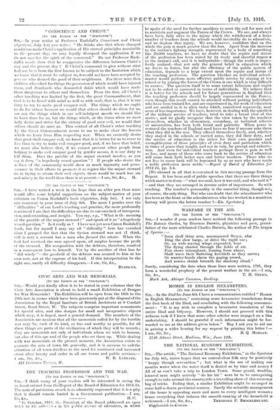THE TEACHING PROFESSION AND THE WAR. [To THE EDITOR OF
THE " SPECTATOR.") S:11,-1 think many of your readers will be interested in seeing the en:lased extract from the Report of the Board of Education for 1914-15. The note of patriotism struck is so admirably expressed that it is a pity that it should remain buried in a Government publication.—I am, " In October, )915, the President of the Board addressed an open letter to hi: eolless.ses in the reblie service of education, in which he spoke of the need for further sacrifices to meet the call for men and to maintain and augment the Forces of the Crown. We are, and always have been, fully alive to the injury which the withdrawal of a largo number of teachers from the schools would inevitably do to education, and we deplore that injury. We are, however, confident that on the whole the gain is much greater than the loss. Apart from the increase to the nation's fighting strength, represented by a body of something like 20,000 teachers, we have no doubt that the repute and status of the profession has been raised by its ready and cheerful respon:e to the nation's call, and it is indisputable—though the truth is imper- fectly realized—that not only the general belief in education which we des's.° to foster, but also the efficiency of the public system of education, depends to a large extent upon the repute and status of the teaching profession. The question whether an individual school- master would perform more effective public service by staying at his school or by joining the forces of the Crown is one which is very difficult to answer. The question itself is to some extent fallacious and ought not .to be asked or answered in terms of individuals. We believe that it is better for the schools and for future generations in England that the teaching profession should be largely represented in the Forces, even though this result cannot be attained without putting individuals who have been trained for, and are experienced in, the work of education and are needed in it to alien tasks which, considered separately, may seem of less importance. We have, however, in dealing with the question of the military service of teachers, tried to take a broad view of the matte; and we gladly recognize that the view taken by the teachers themselves, whether in elementary, secondary, or technical schools or universities, has been both broad and patriotic. When peace is restored the teachers of England need have no fear if anyone asks them what they did in the war. They offered themselves freely, and, whether they stayed in the schools or carried arms, they did their duty, and the service of education is the richer for their own practice and exemplification of those principles of civic duty and patriotism which in times of peace they taught, and not in vain, by precept and exhorta- tion. And even for individual teachers perhaps there is gain as well as loss, and many of those who come back to the service of education will come back both better men and better teachers. Those who do not live to come back will be honoured by us as men who have made a noble profession more noble."—Report of Board of Education for 1914-15, pp. 3-4.
[We abound in all that is contained in this moving passage from the Report. It has been said of public speeches that there are three things which matter in them—" what was said, how it was said, and who said it —and that they are arranged in inverse order of importance. So with teaching. The teacher's personality is the essential thing, though not of course, the only thing. But who can doubt that the schoolmaster who has been at the front or the schoolmistress who has worked in a munition
factory will prove the better teacher I—En. Spectator.]






























 Previous page
Previous page